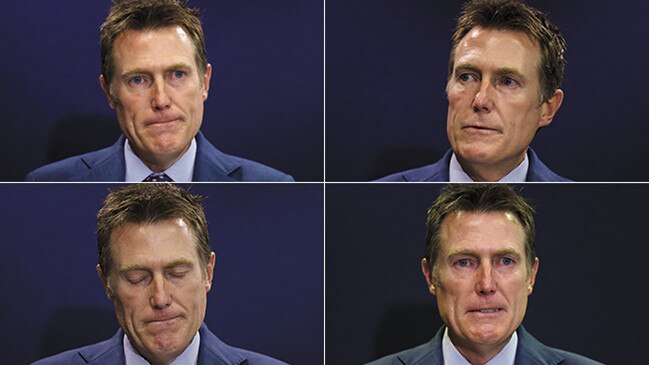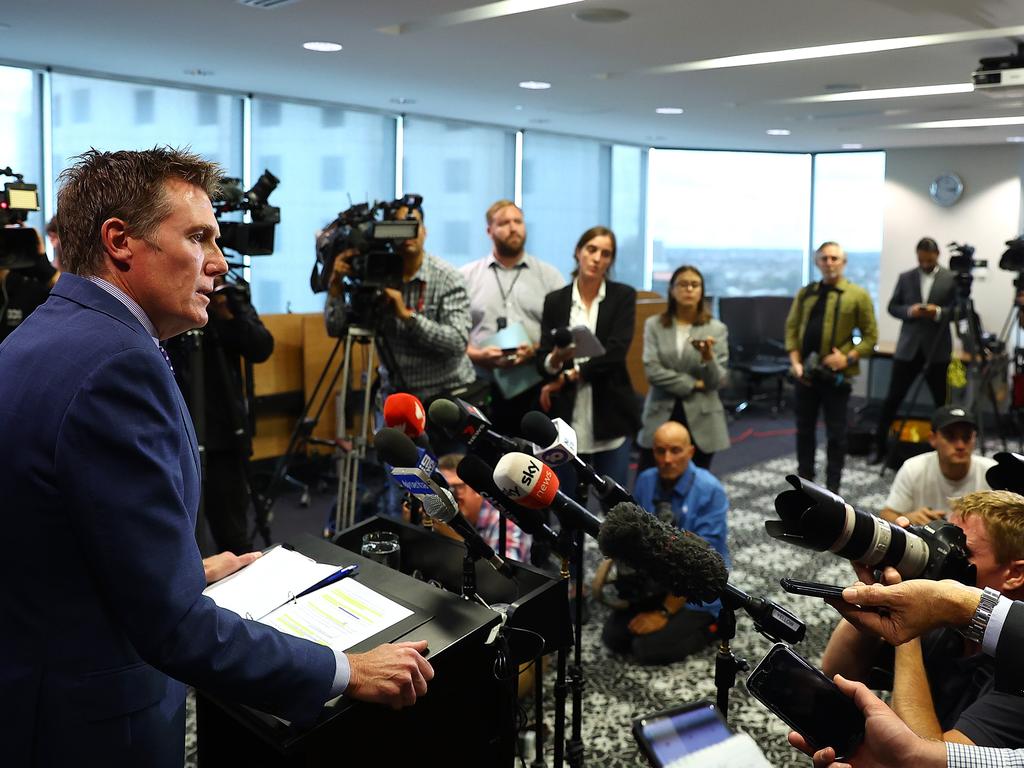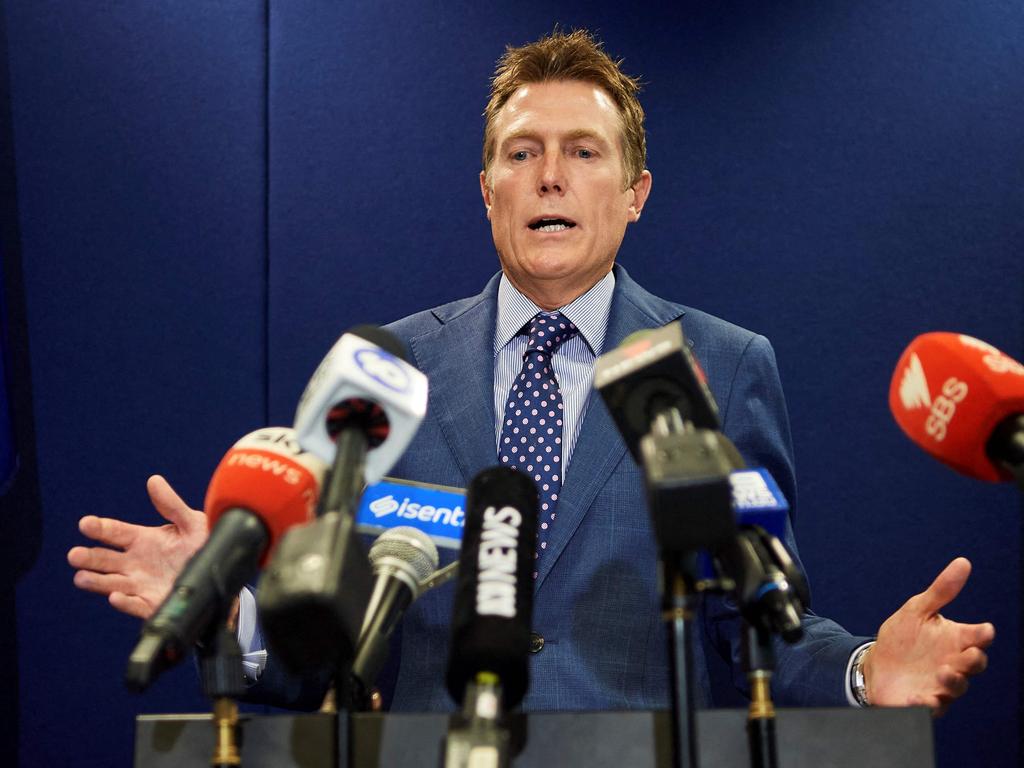When power, politics and principle collide
The pile-on over Christian Porter will prove to be the defining test of Scott Morrison.

The cause of justice is conflated with the quest for political advantage. Nearly every institution is being damaged by different failures around these issues: the federal parliament, the Morrison government, the Labor Party and the media. The central question remains — will our system achieve greater justice for women without abandoning the basic principles of our law and governance?
The political conflagration over Attorney-General Christian Porter and the allegations against him of rape 33 years ago is marked by agonising and competing versions. Yet it goes to the essence of this question. Many Australians have probably made up their minds on the Porter question by instinct. While the dilemma it poses is diabolical and unique, the options are remarkably obvious.
The choice is that Porter either resigns and loses his career because of a rape accusation made against him that he cannot disprove because he lacks the evidence and witnesses to disprove it; or he retains his office because the criminal justice system has decided (so far) that there is no case against him and that he is, therefore, innocent under the law.
Neither option is palatable. A section of the community will be enraged by either course of action. Ultimately, this situation will be resolved by Scott Morrison. It will be sorted within the political system, and this is where it should be sorted. It is about ministerial behaviour and cabinet standards.
Morrison is standing with Porter. He is defending his minister, but also a principle. Morrison said: “We can’t have a situation where the mere making of an allegation, and that being publicised through the media, is grounds for … governments to stand people down.”
Before Porter was even named he was, to a large extent, condemned in a trial-by-media pile on. Indeed, some prominent media figures had issued their judgments even before Porter named and defended himself.
There has been a campaign by friends of the woman involved, along with sections of the media, to expose and condemn Porter because these people are convinced he committed the crime. The central premise of the unsigned letter sent to the Prime Minister and some other politicians the week before last was the demand that because the criminal justice system found no case against Porter, another mechanism must be found to put him on trial.
The letter asked Morrison to set up an inquiry, saying if he failed to do so it would constitute “wilful blindness”. This is now the demand by Labor, the Greens, much of the media and many lawyers.
Such demands are filled with sophistry and hypocrisy. An independent inquiry cannot resolve the issue. It cannot resolve the facts. And it would face the same obstacles as the NSW Police.
Its advocates naturally want a weaker test than the criminal law and specify “the balance of probabilities”. Some even make the ludicrous claim that “this would give Porter the chance to clear his name”. This assumes, of course, that having no criminal action taken against you does not clear your name. That’s a new principle. Beyond that, as Porter has said, he cannot clear his name — and that’s the entire point.
Porter repeatedly said at his media conference that all he can tell an inquiry is that he didn’t commit the crime. “What would I say in front of that inquiry?” he asked. “What would that inquiry ask me to do? To disprove something that didn’t happen 33 years ago.” Asked if he could disprove the allegation, Porter said: “Of course, I can’t.”
He has no evidence; he cannot prove his innocence.
Morrison is right to reject an inquiry, despite the pressure. Claims by its advocates that this is akin to the frequent inquiries conducted by companies and sporting bodies are untenable. They take evidence from the alleged victims about workplace and safety matters and then reach their conclusions.
While this is a unique case, a precedent would be established by an inquiry — the precedent being that a senior public figure cannot retain office after such an allegation without passing the twin tests of surviving the criminal justice process and another so-called “fit and proper” politically authorised inquiry.
Morrison is emphatic he will not authorise an inquiry. Any notion that he will change his mind is remote because he puts the case in terms of core principle: if the legal system concludes there is no case against you, Morrison will not re-litigate the issue in a different form with a different test designed to get a different result.
Opposition Leader Anthony Albanese has made a serious blunder in injecting this change into our politics and governance. It reveals a desperate Labor Party that is now given the opportunity to ruin Morrison’s political dominance by exploiting the rape issue to target the government’s vulnerability with the female vote.
To grasp how far we have come, can you imagine the outcry had the Abbott government in 2014 — on ALP leader Bill Shorten revealing that criminal proceedings were not being taken against him — actually established a second executive government inquiry to test whether Shorten was a “fit and proper” person for high office.
The outcry would have been deafening. Do you doubt for a second that the politicians, media figures and lawyers demanding an inquiry into Porter would have denounced as a politically-induced travesty such an inquiry into Shorten? And they would have been right.
But nobody even suggested it. What did Abbott say? “It’s a personal matter and he’s dealt with it.” If you judge Abbott to be a political thug willing to seize any unscrupulous advantage, what does that tell you about the current issue?
Claims that the two cases, Porter and Shorten, cannot be compared don’t stand up. The decision not to prosecute is the same. The core principle is identical.
Albanese is right to say responsibility for Porter’s fate rests with Morrison. But he is wrong to push for an inquiry as a second test. Labor is exposed to the charge of hypocrisy given the Shorten example. Morrison has made clear he would “welcome” any coronial inquiry into the woman’s death by the South Australian coroner and said he expected Porter would co-operate if required. Given the current situation, such a coronial inquiry seems highly desirable and may help the politicians resolve the current destructive deadlock.
Have no doubt, Morrison, by definition, carries the political responsibility in this issue — whether or not he has an inquiry. This is a prime ministerial pay grade decision. Morrison is standing by Porter, but the politics has a long way to run. Porter is weakened, and trial-by-media — backed by the weight of progressive politics — might succeed in his removal.
Porter’s enduring problem is that if he remains as first law officer, he is tainted by the allegation.
The coalition against Porter is formidable, constituting Labor, the Greens, the ABC and Malcolm Turnbull.
None of them will give up. The ABC is trapped in a dual role. It reports the crisis, yet it is a partisan player — it is the ABC that spent months investigating Porter, and it has been leading the effort to bring him down.
Albanese’s real target is not Porter, it’s Morrison. Albanese’s problem is that while the parties run at 50-50 in the polls, Morrison’s leadership ratings leave Albanese humiliated.
The Labor leader needs to terminate COVID-19 politics. And now he may have found the key. Unless Morrison acts, Albanese will run a relentless campaign in the parliament.
Some women are angry; others are distressed. The government is being damaged with the female vote. How much is hard to judge, but nobody expects Morrison to risk his government on this issue — nor would Porter. Trial by media may turn into trial by parliament as various MPs exploit the crisis and sections of the Senate crossbench flirt with blackmail by threatening the passage of bills unless Morrison acts.
The public, however, might not react as much of the media expects. The 2019 federal election revealed how badly the progressive media can misread the country. Parents have sons as well as daughters. They want their daughters protected from rape and their sons protected on the principle of innocent until found guilty. Much of the reaction outside the beltway may constitute repugnance towards the entire political class.
What makes this case unique is the tragic death of the woman in June 2020 when she took her own life. Both the anonymous letter and the woman’s unsigned statement sent to the NSW Police have been circulated in the media. Nobody reading these documents could doubt the woman’s belief that she had been raped.
Women have every reason not to report rape when it occurs, and there should be no criticism of any decision to delay. In this case, the woman approached NSW Police in February 2020, 32 years after the alleged offence. The police statement this week said she disclosed she had a number of health issues and advised that she “dissociates”.
The main concern of the police “was victim care and welfare”. The woman had serious mental health issues.
On June 23, police say, the woman “sent detectives an email indicating she no longer felt able to proceed with reporting the matter, citing medical and personal reasons. The woman very clearly articulated in that email that she did not want to proceed with the complaint.”
The police did not conduct an investigation because they did not have a signed statement before the woman’s death. On June 25, SA Police advised she had passed away.
In this statement, the woman said she had always remembered the rape. She also says: “I had a better understanding of these memories, and only really understood them once my Sydney-based psychologist, Katie Thorncraft (who specialises in counselling sexual assault survivors), referred me to The Body Keeps Score: Brain, Mind and Body in the Healing of Trauma (Van Der Kolk, 2015) in September 2019.
“Bessel Van Der Kolk (2015) explains that, for survivors of torture and trauma (whether physical, psychological, and/or sexual), our bodies will store traumatic events and only allow them to resurface when our minds are able to examine them, usually several decades later. My Adelaide-based psychiatrist, Dr Tony Davis, confirmed that these are ‘somatic memories’ (ie lodged in the body rather than the brain, although the mind can access them) in an appointment in late 2019.”
The feature of the statement more than three decades later is its exhaustive and horrific detail. Did it occur to any of the politicians that the incredible detail could be due to recovered “memory”? In her statement, the woman also enclosed diary entries, drawings and notes written on pieces of paper from 1991 revealing a state of deep agitation about the alleged incident.
A feature of the anonymous letter sent to the PM and others was the split between the woman’s family and her friends. The letter said the parents “worried” she “may have confected or embellished the allegations due to her mental illness”, while the friends disagreed and did not share the parents’ doubts about the veracity of her claims.
After the woman’s death, her friends and sections of the media decided to carry the torch for justice on her behalf. The upshot is that there is no easy resolution to this crisis. If Porter can be removed by a media and political frenzy based upon an allegation 33 years ago where the criminal justice system has decided there is no case to answer, then — as Porter said — any person can lose their career and job. Nobody can be beyond reproach if they can be undone by an allegation.
Once this technique is proven, it will redeployed. Yet there is much support for this unwise precedent in a country where emotions are running hot. Any idea that this will advance justice for women should be gravely disputed.
On the other hand, Morrison faces an integrity and political dilemma; the opponents will brand Porter an unfit person as Attorney-General if he remains. This will be a judgment they make of Morrison. He hates surrendering to what he calls the “mob”. But the decision he takes, and the way he handles the issue, will be fundamental in defining his prime ministership.






Rape has become a weaponised instrument in our politics. The nation has reached a watershed, aware that better responses are essential in responding to the needs of women who are subject to sexual crimes — but the dispute over the way forward is bitter and contentious.